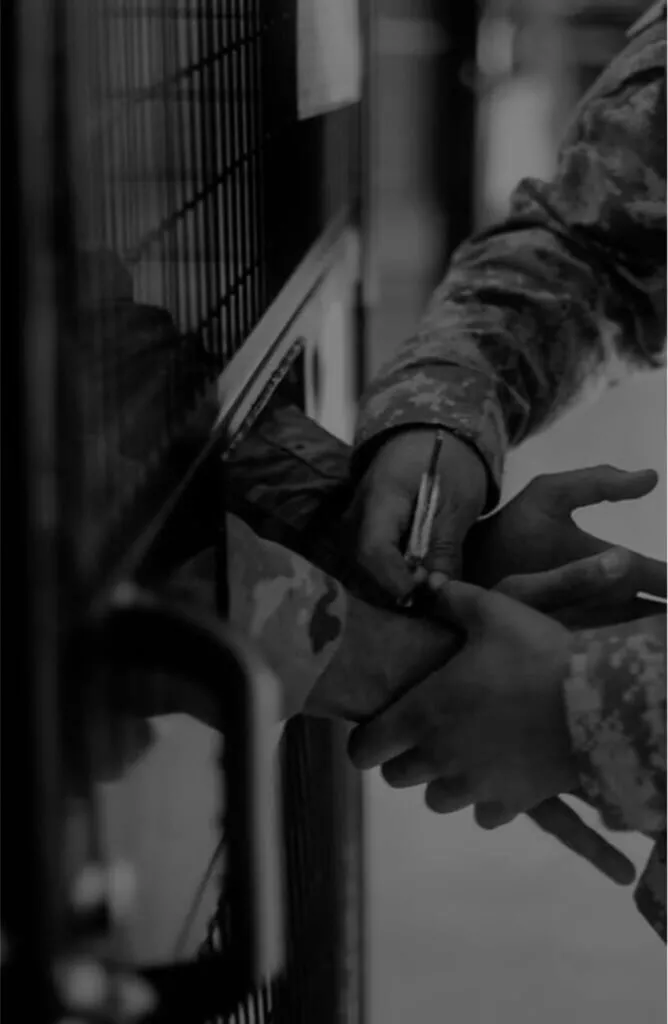
Court-Martial Lawyers
Fighting for Your Freedom and Your Future
Criminal courts-martial present the highest stakes in military justice. If you are convicted, you could face lengthy jail time, a punitive discharge, and an uncertain future. You need the most experienced and dedicated defense team you can find.
We know how terrifying it is to face criminal charges in the military, because we have helped hundreds of military members at court-martial. Whether you are facing allegations of drug use, domestic violence, sexual assault, or other military crimes, it is critically important that you have the best defense attorneys helping you.
In courts-martial, experience wins. It’s plain and simple. The team at The Military Defense Firm has the experience of more than 200 courts-martial. We know how to win, because we have done it before…countless times. And in the military, you only get one shot. You get ONE trial. There are no “hung juries.” You get one chance to protect your future and secure your freedom. You want a defense counsel that has proven, time and time again, that they can deliver the best possible result.

Our Process
1. Aggressive Investigation
If we represent you in a criminal case, we begin with an aggressive investigation of the allegations. We interview witnesses, hunt for evidence, and chase every lead. We want to gather the best evidence in your defense.
2. Intelligent Legal Analysis
We closely analyze all angles of your case, identifying investigators’ mistakes and exposing the government’s errors. We often make persuasive legal arguments to try and get your dismissed before trial.
3. World-Class Trial Advocacy
We are known across the military for our outstanding trial advocacy. We bring the skills developed over hundreds of courts-martial to every criminal trial. Our cross examinations and closing arguments often destroy the prosecutor’s case.
Court-Martial Process
Under military law, the court-martial process is governed by the Uniform Code of Military Justice (UCMJ). Whether you are in the Air Force, Army, Coast Guard, Marine Corps, Navy, or Space Force, the military justice system is largely the same.
The court-martial process can basically be explained in five stages:
- Criminal investigation. Either your chain of command, or assigned military investigators, will conduct an investigation of your case. An experienced military lawyer can help you during this pretrial process by protecting your rights and making calculated decisions about when, if at all, you should share your side of the story.
- Preferral of charges. After an investigation, your chain of command or an assigned prosecutor will review the evidence. If there is “probable cause” to believe you may have committed a crime, charges may be “preferred” against you. You will be provided a copy of the charges and the evidence that supports them.
- Preliminary examination. Oftentimes, your case will be sent to a “preliminary examination” for review, also known as an Article 32 investigation under the UCMJ. During this initial hearing, another lawyer will review the charges and the evidence to determine whether the government should move ahead to a military court-martial.
- Referral of charges. After the preliminary examination, prosecutors or the convening authority may “refer” the charges to a court-martial. There are three different types of court-martial, which are described below. “Referral” of charges is simply the process of sending your case to trial.
- Criminal trial. If your case is “referred” to court-martial, a military judge is assigned, jury members are detailed, and the criminal trial process begins. This includes an arraignment, motions hearings, and the presentation of evidence. At this stage, it is critical that you have the best military defense counsel on your side so that you can receive a “not guilty” verdict.
At all stages of the court-martial process, you should have experienced and dedicated legal representation to help you with your court-martial defense.
Types of Court-Martial
There are three basic types of court-martial:
- Summary court-martial: lowest level. A summary court-martial may be pursued against an enlisted member for low-level criminal conduct. Maximum punishments for E-4 and below at a summary court-martial include reduction to E-1, forfeiture of two-thirds pay for one month, and either 60 days of restriction, 45 days of hard labor without confinement, or 30 days confinement. Maximum punishments for E-5 and above include reduction of one grade, forfeiture of two-thirds pay for one month, and 60 days of restriction.
- Special court-martial: “misdemeanors.” A special court-martial is akin to a “misdemeanor” court in the civilian world.
- Judge alone specials: A judge-alone special court-martial does not include a jury (or “members”). In a “judge alone special,” the maximum punishment is six months confinement and no more than six months of forfeiture of pay. A punitive discharge cannot be imposed by the judge. Other lawful punishments may be imposed.
- Member specials: A special court-martial may also be composed of at least four military members. The maximum punishment at this court-martial is twelve months confinement and a bad conduct discharge. Other lawful punishments, such as forfeiture of pay and reduction in grade, may be adjudged.
- General court-martial: “felonies.” A general court-martial is like a “felony” court in the civilian world. General courts-martial may be decided by a judge alone or a group of eight members, depending on the choice of the accused / defendant. There is no limitation to the sentence of a general court-martial, except the maximum for the alleged offenses.
Court-Martial Punishments
Every case is different. Whether you face allegations of sexual assault, larceny, drug use, or another military crime, court-martial convictions may lead to certain punishments that will affect your military career.
Court-martial punishments may include:
- Reprimands
- Reduction in grade
- Forfeiture of pay and allowances
- Restriction to limits
- Hard labor without confinement
- Confinement
- Bad conduct discharge
- Dishonorable discharge
